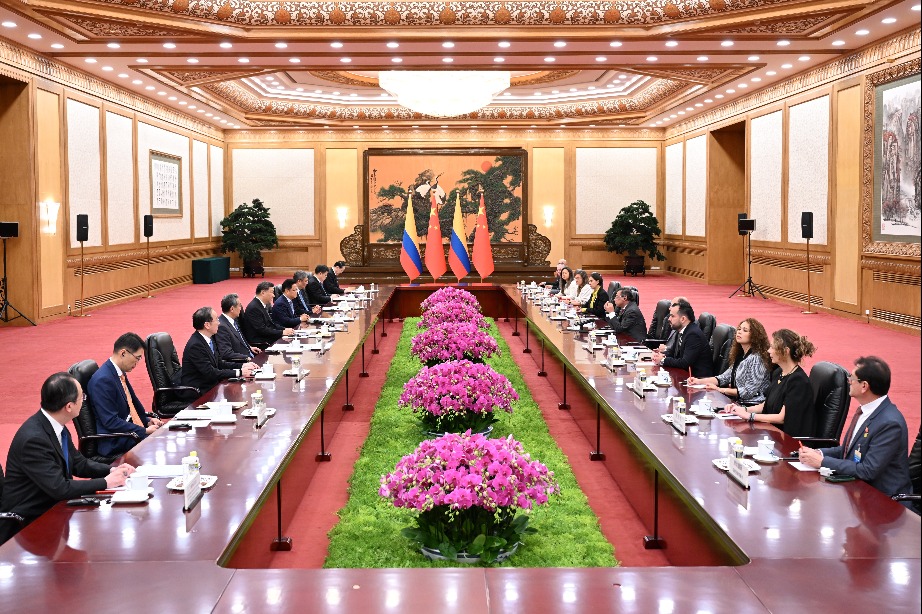Allying more digitally


China can deepen cooperation with countries involved in the Belt and Road Initiative and the RCEP to build an international platform for the digital economy
The participation of a country in the global digital economy is often closely related to its digital economic growth. This conclusion is based on the TIMG index, which aims to measure the development of the global digital economy in four dimensions — technology, infrastructure, market and governance.
According to the index, there are five important trends in international digital economy cooperation.
First, regional organizations have become platforms for signing international cooperation policies in the digital economy. For example, members of the European Union have multiple platforms for participating in international cooperation in the sector. Many of them can rely on global or regional platforms such as the EU and the OECD to actively promote multilateral or bilateral cooperation in global digital economy.
Second, major powers lead the formulation of international cooperation rules for the digital economy. Apart from the EU, the United States and the United Kingdom are leaders in international digital economy cooperation.
Third, leading countries in digital economic growth are actively participating in and attempting to lead international cooperation. As of 2022, Japan, Canada, Australia and Singapore had all joined in around 35 to 40 international digital collaborations.
In stark contrast, by 2021, although China's TIMG index ranked eighth globally, there were only 17 international cooperation policies that China had joined in and led.
Fourth, emerging markets and developing countries such as China, India and Indonesia are actively participating in international digital economy cooperation. As of 2022, China, Indonesia and India had participated in 17, 18 and 19 international cooperation projects, respectively.
Fifth, medium-developed countries in global digital economy are striving to enhance their own strength through international cooperation. For example, countries ranked 20th to 60th in the TIMG index in 2021, such as Italy, Spain, Poland, Croatia and others, are striving to improve their digital economy development level through international cooperation, which demonstrates those latecomers' endeavors and catch-up efforts in the digital economy.
In general, based on the TIMG index score and international cooperation in the digital economy, there is a positive correlation between participation in international digital economy cooperation and the overall performance of the digital economy. However, there is still a mismatch. At the same time, the modes, targets and fields of international cooperation in the digital economy vary significantly. The cooperators of the US, the United Kingdom and Canada are mainly developed regions and countries such as Western Europe and Japan.
As an East Asian country, Japan mainly chooses to cooperate with developed countries represented by the UK and the US, and selectively conducts international digital economy cooperation with Asian countries with geopolitical interests such as the Republic of Korea and India. Geopolitical interests are Singapore's main consideration for choosing cooperators, with its main partners including the ROK, Japan, India, China, Indonesia and others.
Currently, countries that have cooperated with China in the digital economy show three important characteristics.
First, the country with the most international cooperation is the US.Although China and the US both have a large number of international cooperation policies in the digital economy, the main form of their cooperation is multilateral. At present, they have not signed bilateral cooperation policies or agreements on the digital economy. Meanwhile, China is actively carrying out international cooperation with emerging markets and developing countries such as Saudi Arabia, India, Turkiye, Indonesia and South Africa.
Second, China is accelerating the establishment of digital economic cooperation with countries and regions involved in the Belt and Road Initiative. Since 2017, when it officially proposed to build the Digital Silk Road, China has continued to strengthen cooperation with countries and regions involved in the Belt and Road Initiative in cutting-edge fields such as the digital economy, artificial intelligence, nanotechnology and quantum computing to advance the development of big data, cloud computing, smart cities and other fields, and constantly innovate the construction of the Belt and Road.
Third, China is conducting deeper cooperation with countries having close and long-term economic and trade exchanges in the field of the digital economy. For example, the leaders of BRICS countries reached the Digital Economy Partnership Framework at their 14th summit in 2022, forming an important consensus on deepening cooperation among the BRICS countries and initiating a new process of cooperation in the field.
Based on the digital economy development of countries and regions involved in the Belt and Road Initiative measured by the TIMG index, on the one hand, since 2017, these countries and regions' digital economic growth has accelerated, but their development gap is relatively obvious. In 2021, the countries and regions with highest ranking in TIMG index are, respectively, Singapore, China, the United Arab Emirates and Israel; while countries such as Yemen, Laos, Kyrgyzstan and Lebanon have relatively weak digital economies.
On the other hand, from the characteristics of countries that have established international digital economy cooperation with China, in 2021, except for Singapore, which has a relatively high ranking in the TIMG index, other countries and regions have ranked in the middle or lower position globally; from the perspective of segmented indicators, countries that have established digital economic cooperation with China still have room for technology, infrastructure, market, and governance improvements.
Based on the analysis of international cooperation in the global digital economy using the TIMG index, China's international cooperation in this field has broad prospects.
In the future, China can strengthen international cooperation from the following three aspects: First, a new round of digital economy cooperation will start under the existing international economic cooperation pattern. Relying on international organizations such as the United Nations and G20 to carry out multilateral cooperation, fully leveraging China's active role in international cooperation such as the Digital Economy Partnership Agreement; second, give full play to China's leading advantages in digital economic development, carry out in-depth international cooperation with countries involved in the Belt and Road Initiative, members of the Regional Comprehensive Economic Partnership and other regions, build an international cooperation platform for digital economy based on common interests, combine China's comparative digital infrastructure and technological advantages with the digital market of the host country, and seek more opportunities for international cooperation; the third is to actively engage in international cooperation and exchanges with developed countries in the digital economy, with a focus on enhancing cooperation in digital technology, strengthening policy coordination in digital governance, jointly building a new framework for international digital economy cooperation, and actively participating in the formulation of global rules for the digital economy.
Chen Yinmo is a researcher with the National Institution for Finance and Development. Zhang Ming is deputy director of the Institute of Finance &Banking at the Chinese Academy of Social Sciences and deputy director of the National Institution for Finance and Development. Wang Zhe is a post-doctorate at the Institute of Finance &Banking at the Chinese Academy of Social Sciences. The authors contributed this article to China Watch, a think tank powered by China Daily. The views do not necessarily reflect those of China Daily.
Contact the editor at editor@chinawatch.cn.































